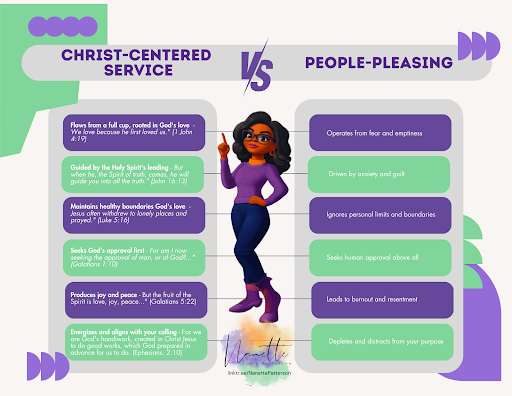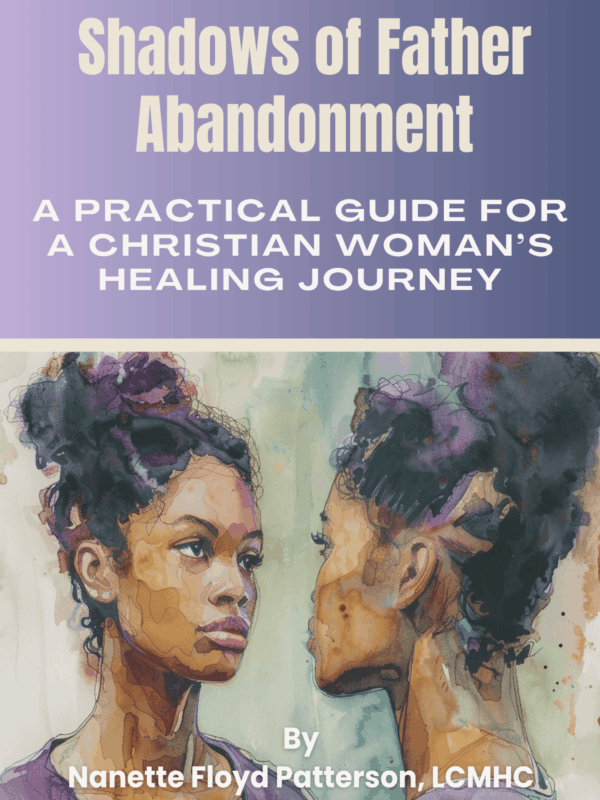
Want to know one of the most common patterns I see in my Christian clients that’s stealing their peace? It’s people-pleasing disguised as godly service. They come in worn out, spiritually drained, yet still feeling guilty for even thinking about saying ‘no.’ If you’re nodding your head right now, pull up a chair and grab your tea or coffee. We need to have an honest conversation about the difference between Christ-centered serving and people-pleasing.
Maybe you’re constantly saying “yes” when you want to say “no” or bending over backward to avoid disappointing others. People-pleasing can feel like kindness, but in reality, it’s often a subtle form of bondage, a cycle that drains your energy, clouds your purpose, and distances you from God’s plan for your life.
Understanding People-Pleasing in Christian Life
People-pleasing is the habit of prioritizing others’ needs, opinions, or happiness over your own—often at the expense of your well-being. While it might stem from a genuine desire to help, it can become unhealthy when driven by fear of rejection, a need for approval, or feelings of guilt.
Let’s start with the signs that you may be a people-pleaser.
Signs You Might Be a People-Pleaser:
- You avoid saying “no,” even when it’s necessary.
- You feel responsible for others’ happiness.
- You seek validation to feel good about yourself.
- You’re uncomfortable expressing your true feelings.
- You feel drained after interactions with certain people.
- You apologize excessively, even for things that aren’t your fault
- You struggle to make decisions without consulting others first
- You often neglect your prayer/devotion time to help others
- You feel guilty when you take time for self-care or rest
- Your service comes from fear rather than joy
- You find yourself explaining or justifying your decisions to everyone
- You take on other people’s problems as your own
- You minimize your own needs or desires to keep peace
- You feel resentful while serving but hide those feelings
- Your relationship with God feels distant because you’re so busy serving others
I know. It’s a long list. But awareness is so vital to growing.
The Spiritual Cost of People-Pleasing
When we live for the approval of others, we risk losing focus on the One whose opinion matters most. Galatians 1:10 asks, “Am I now trying to win the approval of human beings, or of God? Or am I trying to please people? If I were still trying to please people, I would not be a servant of Christ.”
Grow Through It Question: In what areas of your life are you seeking others’ approval over God’s?
Christ-Centered Service vs. People-Pleasing: Understanding the Difference
You know how sometimes it’s hard to tell if you’re serving because you really want to or because you feel like you have to? Here’s what these different approaches look like in real life:
Biblical Characteristics of Christ-Centered Service
- Flows from a full cup, rooted in God’s love (John 15:9)
- Guided by the Holy Spirit’s leading (John 16:13)
- Maintains healthy boundaries (Luke 5:16)
- Seeks God’s approval first (Galatians 1:10)
- Produces joy and peace (Galatians 5:22)
- Energizes and aligns with your calling (Ephesians 2:10)
Common Patterns of People-Pleasing Behavior
- Operates from fear and emptiness
- Driven by anxiety and guilt
- Ignores personal limits and boundaries
- Seeks human approval above all
- Leads to burnout and resentment
- Depletes and distracts from your purpose
I created this visual guide to help you spot the difference:

“But Doesn’t the Bible Say…” (Addressing Common Questions)
Wait…don’t come at me yet.😊 I know what some of you might be thinking. “But what about all those verses about denying ourselves and serving others?” It’s a great question, and let’s look at what Scripture really tells us about this.
Denying Ourselves vs. People-Pleasing
When Jesus said, “Deny yourself, take up your cross, and follow me” (Matthew 16:24), He was calling us to surrender to God’s will – not to become everyone’s yes-person! Think about it: Jesus denied Himself for God’s purposes, not for everyone’s demands. He actually said “no” quite often when things didn’t align with His Father’s plan.
Looking to Others’ Interests
Here’s another one that often comes up. Philippians 2:4 tells us to “look not only to your own interests, but also to the interests of others.” Did you catch that word “also“? It doesn’t say “only to the interests of others.” God’s wisdom includes balance – caring for others while being a good steward of what He’s given us, including our time and energy.
Following Jesus’s Example
“But Jesus served everyone!” Actually, He didn’t – and this might surprise you. Yes, Jesus served with deep compassion, but He also:
- Withdrew from crowds to pray (Luke 5:16)
- Said no to good requests that weren’t His priority (Mark 1:37-38)
- Set clear boundaries with family and friends (Matthew 12:46-50)
- Kept His focus on God’s will, not people’s expectations (John 6:15)
The Heart of Submission
When Scripture talks about submitting to one another (Ephesians 5:21), it’s always in the context of our primary submission to God. True Christian service flows from that relationship first – not from trying to make everyone happy.
The key? All these verses point to Christ-centered service, not people-pleasing. The difference is in who we’re really living for.
Understanding the Root Causes of Christian People-Pleasing
People-pleasing often stems from early experiences, such as:
- Family Dynamics: Were your feelings minimized or ignored growing up?
- Perfectionism: Striving for approval often ties your worth to your performance
- Past Trauma: Negative experiences can make you overly sensitive to others’ needs
- Cultural or Religious Conditioning: Misunderstood messages about self-sacrifice
Grow Through It Question: What early beliefs about approval or rejection still influence you today?
How Jesus Modeled Healthy Boundaries
When we look at Jesus’s life, we see someone who:
- Said “no” to urgent requests when they didn’t align with His mission
- Regularly withdrew from crowds to pray, even when people were looking for Him (Luke 5:16)
- Spoke truth, even when it wasn’t popular or “nice”
- Remained clear about His boundaries and purpose, even in the face of others’ demands (Matthew 5:37)
Steps to Break Free from People-Pleasing
The good news. You don’t have to stay trapped in the cycle of people-pleasing. Here are steps to help you break free:
1. Anchor Your Identity in Christ
Your worth isn’t based on how much you do for others but on who God says you are. Ephesians 2:10 reminds us, “For we are His workmanship, created in Christ Jesus for good works, which God prepared beforehand.”
2. Recognize and Respond to Triggers
People-pleasing often arises from specific triggers. Learning to identify and respond to these mindfully is crucial.
3. Practice Biblical Boundary Setting
Setting boundaries is essential to prioritizing your well-being. Here are some Christian ways to say “no”:
- “I appreciate the offer, but I have other commitments.”
- “Thanks for thinking of me, but I need to focus on myself right now.”
4. Release the Guilt Through God’s Truth
Guilt is a common barrier to setting boundaries, but it doesn’t come from God. Psalm 55:22 says, “Cast your burden on the Lord, and He will sustain you.”
5. Create Space for Spiritual Renewal
Jesus often withdrew to quiet places to rest and pray (Mark 6:31). Following His example is crucial for sustainable service.
Living in the Freedom of Christ-Centered Service
Breaking free from people-pleasing is a journey, not a quick fix. Romans 12:2 encourages us, “Do not conform to the pattern of this world, but be transformed by the renewing of your mind.”
Grow Through It Question: What’s one step you can take today to align your actions with God’s truth?
Take Your Next Step Toward Freedom
I see you nodding along as you read my blog (and probably saying “Amen!” too). Maybe you’re thinking, “Wow, this hits close to home” as you reflected on the Grow Through It Questions like:
- Where are you seeking others’ approval over God’s?
- What early beliefs about approval still influence you?
- How can you align your actions with God’s truth?
You know what? It’s one thing to recognize these patterns, but it’s another thing to actually change them. (Trust me, I get it!) That’s exactly why I created the “5 Day People-Pleasing Detox.” Think of it as your friendly guide to:
- Taking those first steps toward freedom
- Finally saying “no” without feeling guilty
- Trading people-pleasing for peace
- Living with God-given confidence
Want to know the best part? It’s absolutely free. Because I believe so strongly in this journey from people-pleasing to God-pleasing, I want to put this resource right in your hands.
Ready to take that first step? Grab your free “5 Day People-Pleasing Detox” and let’s start this journey together.
Remember: You weren’t created to live for everyone else’s approval. You were created for His glory!





